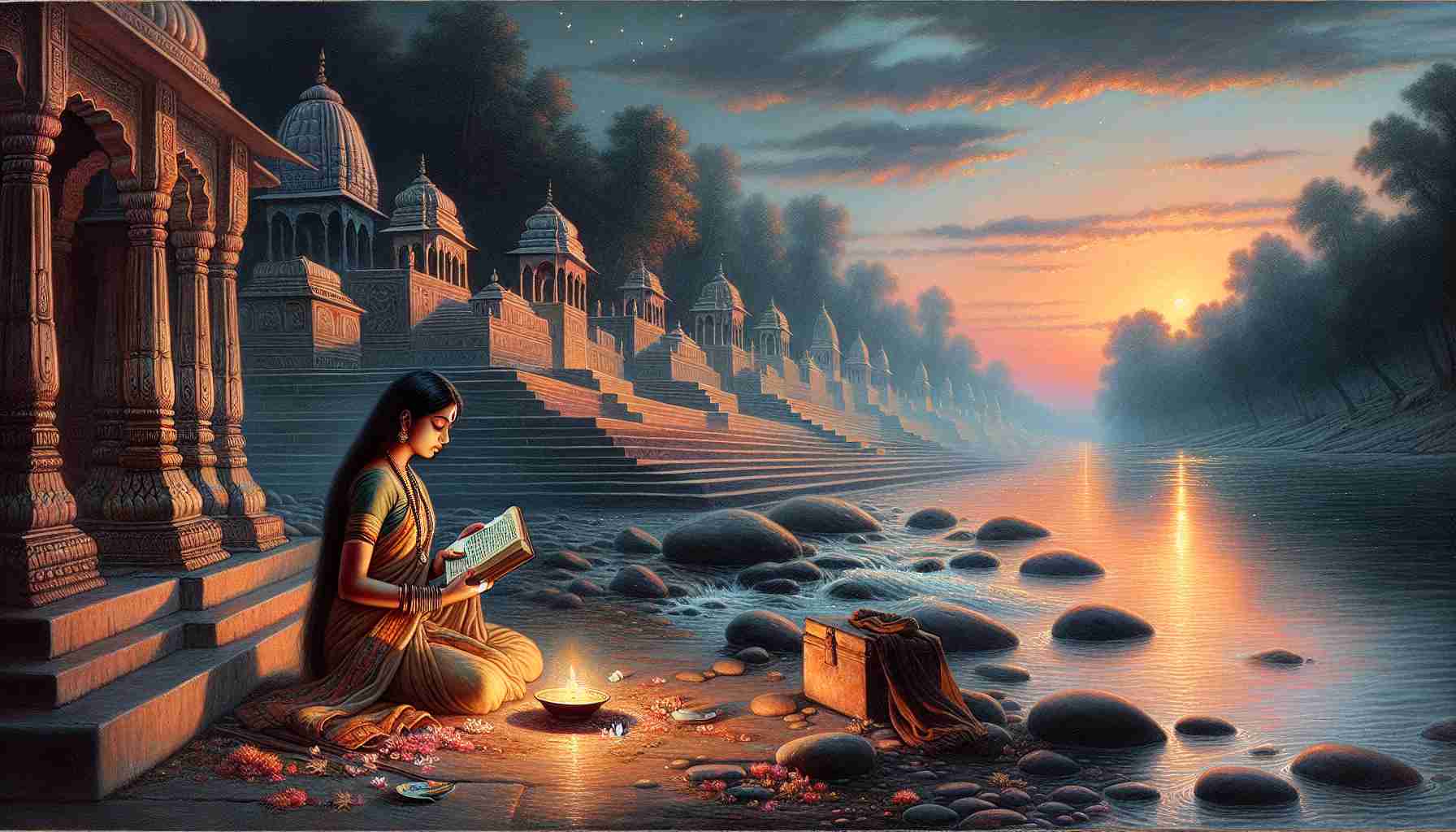

I am Meera, daughter of a schoolteacher from the quiet town of Haridwar, where the Ganga flows like a silken whisper through ancient ghats. I was always the one who blended in—not too clever, not too beautiful, not too much of anything. Most days, I moved through the world as if invisible.
For years, I thought it was humility, this smallness I carried. But really, it was shame. Shame that I wasn’t someone the Divine could care about. I watched others chant, sing, and stand boldly before the deities with hope in their eyes. I bowed my head mechanically, never daring to think I deserved to be seen.
One monsoon evening, after yet another long day of feeling like I didn’t belong in my own life, I wandered to the river. The Ganga had risen high, curling and dancing with power under the lantern-lit sky. I sat by a fraying tree and tried to pray—if only to stop the ache in my chest.
But nothing came. Just silence.
I pulled out the small cloth pouch my nani gave me when I turned sixteen. Inside was a folded page from the Bhagavad Gita. She said, “When your heart forgets who you are, read this.” I hadn't opened it in years.
With trembling fingers, I unfolded the faded paper. It read: “The soul is neither born nor does it die. It is eternal, unborn, and indestructible.” — Bhagavad Gita 2.20.
I read it again and again. Eternal. Indestructible. Not worthless.
As the wind rushed through the peepal leaves overhead, something opened inside me. For the first time, it struck me—my true nature wasn’t this fearful, shrinking thing I had become. The atman—my soul—was sacred. Part of Brahman, the Divine. That meant... I belonged. Always had.
I thought of the Katha Upanishad, where it says, “The self is not known through study, nor through speech… but to him whom the self chooses, the self reveals.”
In that moment, the silence wasn’t empty. It was full.
A soft warmth spread in my chest. Not loud joy. Not sudden ecstasy. Just a sacred hum inside, like a diya—an oil lamp—quietly catching light again.
The next morning, I returned to the river and offered a marigold into the water. I whispered nothing dramatic—just “Thank you.”
In the days that followed, I still had my struggles. Some mornings, the old doubts crept back. But now, I remembered the words from the Chandogya Upanishad: “Tat Tvam Asi”—You are that. That Divine spark. Hidden, maybe. But never lost.
I light a diya every evening now. Not to ask for anything. Just to honor the light that never left.
Let me tell you this, if you ever forget your worth—remember what the Gita says: Nothing can destroy the soul. Your sacred spark is always there… waiting for you to see it again.
I am Meera, daughter of a schoolteacher from the quiet town of Haridwar, where the Ganga flows like a silken whisper through ancient ghats. I was always the one who blended in—not too clever, not too beautiful, not too much of anything. Most days, I moved through the world as if invisible.
For years, I thought it was humility, this smallness I carried. But really, it was shame. Shame that I wasn’t someone the Divine could care about. I watched others chant, sing, and stand boldly before the deities with hope in their eyes. I bowed my head mechanically, never daring to think I deserved to be seen.
One monsoon evening, after yet another long day of feeling like I didn’t belong in my own life, I wandered to the river. The Ganga had risen high, curling and dancing with power under the lantern-lit sky. I sat by a fraying tree and tried to pray—if only to stop the ache in my chest.
But nothing came. Just silence.
I pulled out the small cloth pouch my nani gave me when I turned sixteen. Inside was a folded page from the Bhagavad Gita. She said, “When your heart forgets who you are, read this.” I hadn't opened it in years.
With trembling fingers, I unfolded the faded paper. It read: “The soul is neither born nor does it die. It is eternal, unborn, and indestructible.” — Bhagavad Gita 2.20.
I read it again and again. Eternal. Indestructible. Not worthless.
As the wind rushed through the peepal leaves overhead, something opened inside me. For the first time, it struck me—my true nature wasn’t this fearful, shrinking thing I had become. The atman—my soul—was sacred. Part of Brahman, the Divine. That meant... I belonged. Always had.
I thought of the Katha Upanishad, where it says, “The self is not known through study, nor through speech… but to him whom the self chooses, the self reveals.”
In that moment, the silence wasn’t empty. It was full.
A soft warmth spread in my chest. Not loud joy. Not sudden ecstasy. Just a sacred hum inside, like a diya—an oil lamp—quietly catching light again.
The next morning, I returned to the river and offered a marigold into the water. I whispered nothing dramatic—just “Thank you.”
In the days that followed, I still had my struggles. Some mornings, the old doubts crept back. But now, I remembered the words from the Chandogya Upanishad: “Tat Tvam Asi”—You are that. That Divine spark. Hidden, maybe. But never lost.
I light a diya every evening now. Not to ask for anything. Just to honor the light that never left.
Let me tell you this, if you ever forget your worth—remember what the Gita says: Nothing can destroy the soul. Your sacred spark is always there… waiting for you to see it again.